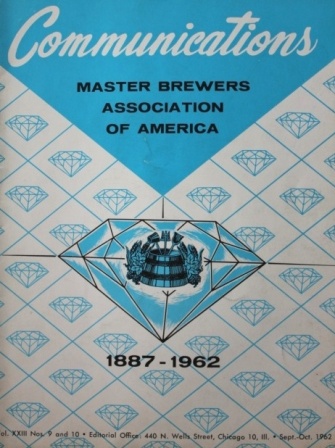
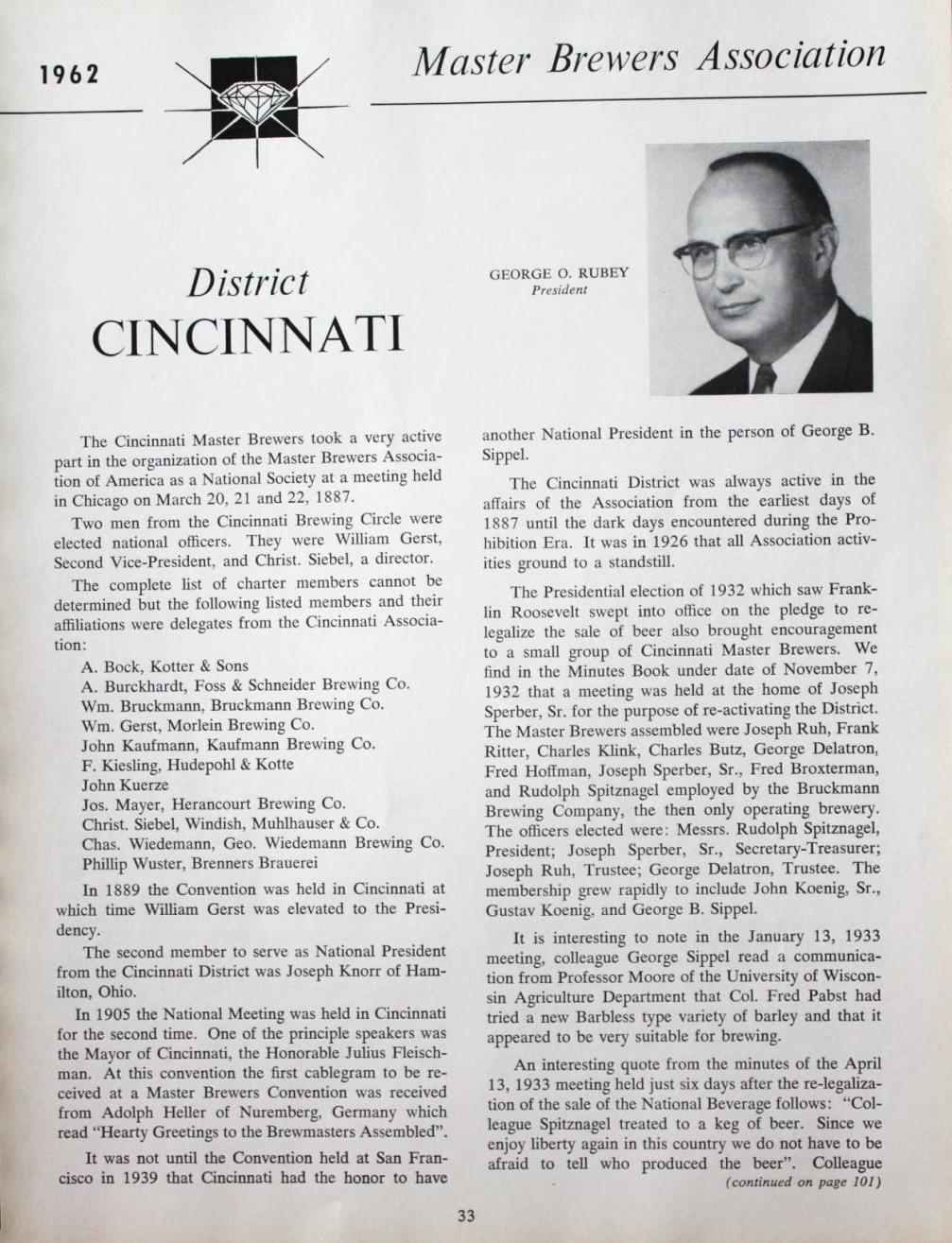 From MBAA's two collections of district histories—the 75th Diamond Jubilee published in1962 and the 100th Golden Jubilee published in 1987—I am excited to share both editions’ celebration of my home district, District Cincinnati. As you can probably figure, the rich history of District Cincinnati serves as the foundation for what has evolved into our recent name change to District Midwest. As always, I have included digital images of both histories for you to read for yourself and enjoy.
From MBAA's two collections of district histories—the 75th Diamond Jubilee published in1962 and the 100th Golden Jubilee published in 1987—I am excited to share both editions’ celebration of my home district, District Cincinnati. As you can probably figure, the rich history of District Cincinnati serves as the foundation for what has evolved into our recent name change to District Midwest. As always, I have included digital images of both histories for you to read for yourself and enjoy.
The 1962 Communications Diamond Jubilee Celebration piece was written by then District President George Rubey of Wedemann Brewing Company. George began his piece by establishing the fact that District Cincinnati was one of the original districts present at the first Chicago meeting in 1887 and became one of the original Charter Members. 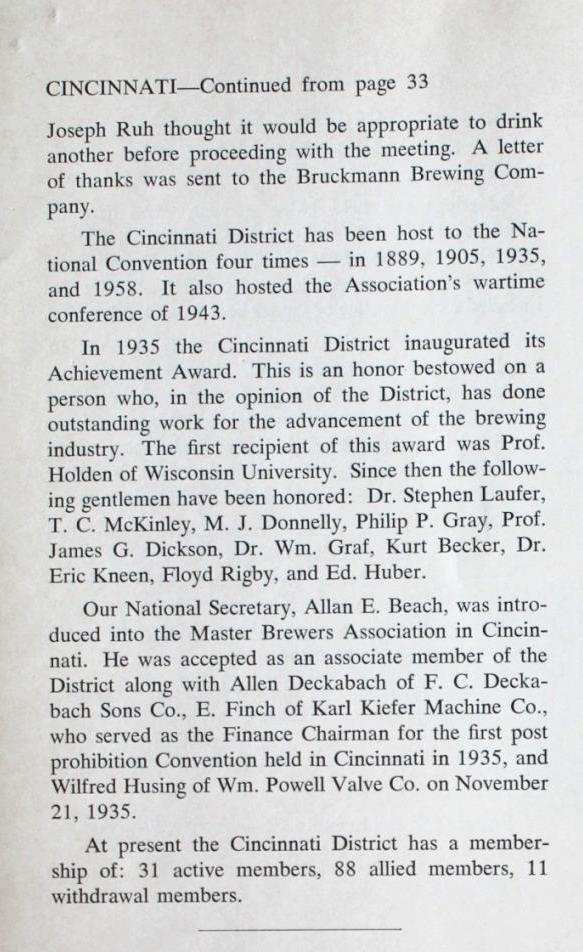 He quite proudly points out that two gentlemen from "Cincinnati Brewing Circles" were elected as original officers. He further provides an invaluable list of other Cincinnati Brewers who attended that first MBAA meeting! I particularly love his reference to Meeting Minutes Books. Oh... how I wish these had been properly saved and archived! George writes:
He quite proudly points out that two gentlemen from "Cincinnati Brewing Circles" were elected as original officers. He further provides an invaluable list of other Cincinnati Brewers who attended that first MBAA meeting! I particularly love his reference to Meeting Minutes Books. Oh... how I wish these had been properly saved and archived! George writes:
The Presidential election of 1932 which saw Franklin Roosevelt swept into office on the pledge to relegalize the sale of beer also brought encouragement to a small group of Cincinnati Brewers. We find in the Minutes Book under the date of November 7, 1932 that a meeting was held in the home of Joseph Sperber Sr., for the purpose of reactivating the District.
George goes on to list all attendees at that critical 1932 "reactivation" meeting, a valuable piece of District Midwest history!!
George also found it important enough to share this little gem:
It is interesting to note in the January 13, 1933, meeting, colleague George Sippel read a communication from Professor Moore of the University of Wisconsin Agriculture Department that Col. Fred Pabst had tried a new Barbless type variety of barley and that it appeared to be very suitable for brewing.
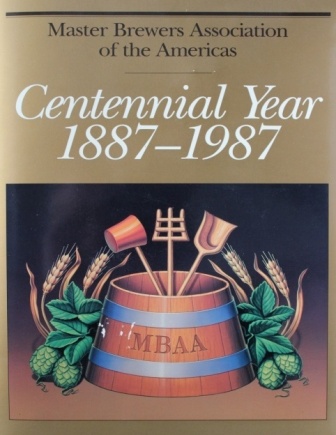
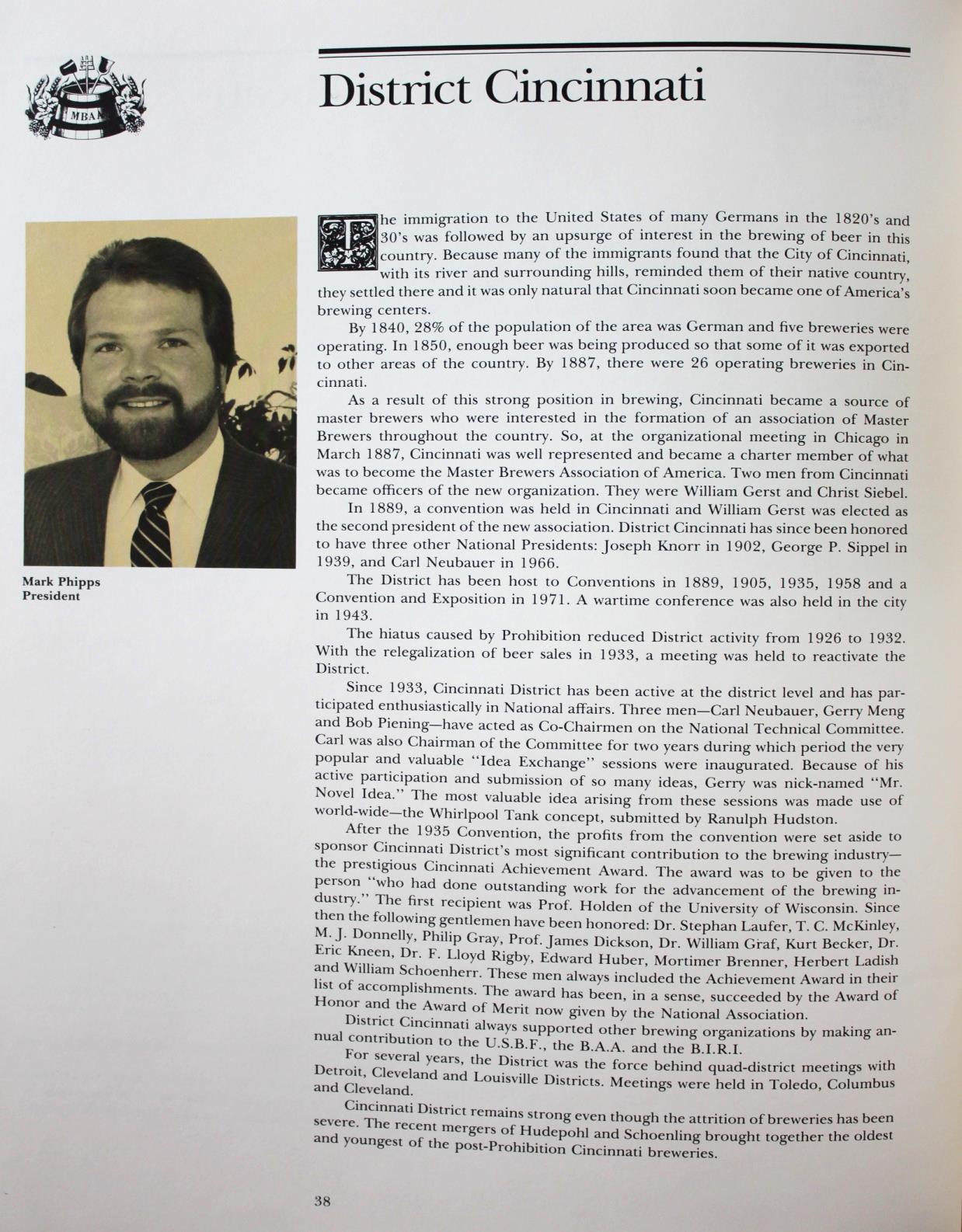 The 1987 Golden Jubilee Celebration district history was written by then District President Mark Phipps, brewmaster at Hudephol-Schoenling Brewing Co. Mark begins his district history by celebrating Cincinnati's uniqueness as the recipient of a major influx of German immigrants into the area from the 1820s extending over several decades. The city's Deutschland-like geography lured those immigrants to the area, where many remained.
The 1987 Golden Jubilee Celebration district history was written by then District President Mark Phipps, brewmaster at Hudephol-Schoenling Brewing Co. Mark begins his district history by celebrating Cincinnati's uniqueness as the recipient of a major influx of German immigrants into the area from the 1820s extending over several decades. The city's Deutschland-like geography lured those immigrants to the area, where many remained.
Because many immigrants found that the City of Cincinnati with its river and surrounding hills, reminded them of their native country, they settled there and it was only natural that Cincinnati became one of America's brewing centers.
By 1840, Mark points out that fully 28% of the city's population were German. By 1887, the very year MBAA was founded, there were 26 operating breweries in the city.
Mark shares that the district was host to National Conventions in 1889, 1905, 1935, and 1958. Since his history was published, we can also include a convention seven years later in 1994.
He also shares the origins of MBAA's Award of Honor and Award of Merit.
After the 1935 Convention, the profits from the convention were set aside to sponsor Cincinnati district's most significant contribution to the brewing industry—the prestigious Cincinnati Achievement Award. The award was to be given to the person 'who had done outstanding work for the advancement of the brewing industry'. The award has been, in a sense, succeeded by the Award of Honor and the Award of Merit now given by the National Association.
The Award of Honor is given to an MBAA member who has rendered outstanding service to the association. The award consists of a plaque and complimentary MBAA Annual Conference registration.
The Award of Merit may be given annually to an individual (or individuals if they have worked as a team) who, in the opinion of the Executive Committee, has made an outstanding contribution to the brewing industry and who will be invited to give a lecture at the annual meeting.
The district's name change was driven by several factors. At two previous Board of Governors meetings—one in Portland, Oregon, in July 2012, and the other in Austin, Texas in October 2013—much of the dialogue centered upon ensuring value and driving relevance to our membership. MBAA's Strategic Plan and its accompanying objectives dealt with encouraging more participation in our local districts. Answering this call, many of us in District Cincinnati began discussing the possibility of changing the name of our local district from “District Cincinnati” to... something else that would better reflect just who we had become. Our boundaries now included the entire state of Ohio, parts of eastern Indiana, and northern Kentucky.
Over the course of several district meetings, members discussed the pros and cons of the name change. Some district members were very much opposed to the change, citing the long-standing heritage of Cincinnati and its brewing traditions as pointed out by both George Rubey and Mark Phipps in their respective short histories. Others reminded our members that even MBAA has changed its name three times since 1887 to better reflect its purpose! "District Midwest" was suggested: a name considered far more inclusionary. It acknowledges and receives with open arms the gifts of the separate brewing heritages of our entire three-state geography.
The change was agreed upon at our April 6, 2013, district meeting, quite fittingly, at the Morlein Lager House... in downtown Cincinnati. And, on March 20, 2014, District Cincinnati officially became District Midwest.
District Midwest continues to be a vibrant, forward-thinking success story. Today, the district is a showcase of collaboration among the growing microbrewery and craft beer segments, while blessed with the presence of two mega breweries. I am happy to share both of these vignettes of rich District Midwest history with our general readership. And even though the original documents are archived, the ability to share them with our readership once again showcases the value of “digital” to all of our districts in matters of history and heritage.
